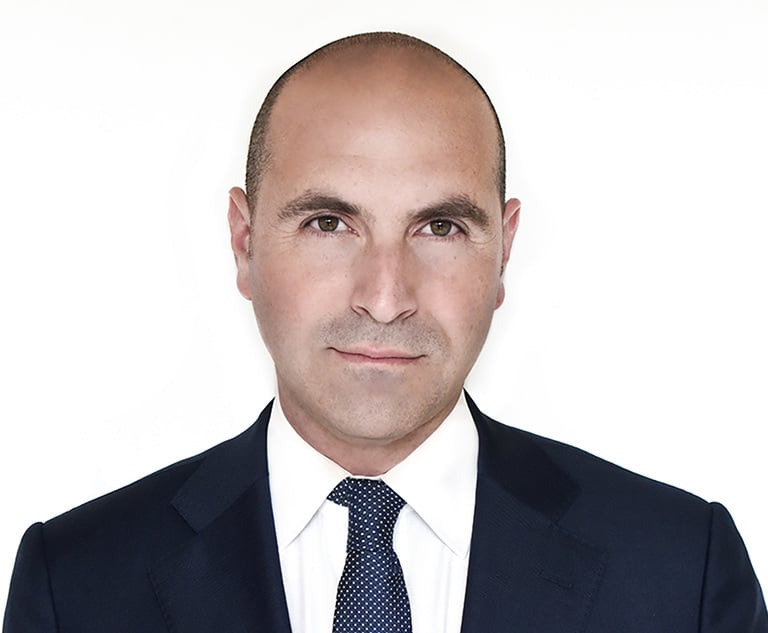 Jury Software. Photo: Shutterstock.com
Jury Software. Photo: Shutterstock.comCoral Gables Litigator Launches Digital Jury-Selection Software and Subscription Service
Attorney Alex Alvarez spearheaded the development of Momus Analytics and touts it as the first software to use comprehensive data to rate jurors and predict how they'll impact a case.
November 01, 2019 at 06:16 PM
5 minute read
A Coral Gables lawyer has released a data-driven jury-selection software that he claims is a first of its kind.
Friday marked the launch of Momus Analytics, a digital platform designed to help attorneys streamline the jury-selection process and predict juror behavior. Creators say it goes beyond administrative duties and offers personality profiles of prospective jurors.
Momus—named for the Greek god of mockery, blame, ridicule and censure, according to its press release—provides lawyers with managerial tools meant to keep pace with every step of the process, ranging from initial juror screening all the way to final jury selection. The program allows users to input data and build neatly organized case files and profiles on potential jurors.
Momus is touting its juror-profile feature as its main selling point. Alex Alvarez, the trial attorney who spearheaded the software's development, claims Momus is the first jury selection software to utilize data points to rank and rate prospective jurors. The software processes biographical information, public social media posts, filled-out questionnaires and other input to produce individualized personality profiles on jurors. Momus partially classifies jury members using their perceived aptitude for leadership, as well as their attitudes toward personal and social responsibility.
Alvarez specializes in tobacco litigation and has achieved multimillion-dollar verdicts over the course of his career. He said the methodology deployed by Momus was conceived by him, and has been repeatedly tested and refined through the years.
"We have a ranking system: the personal responsibility-driven jurors, which are your bad jurors for a plaintiff, the neutral jurors, and then who I call socially responsible jurors, who are jurors who tend to favor the plaintiff's position," he said.
According to Alvarez, Momus was developed as a means to give plaintiffs attorneys an edge in litigation.
"We know that statistically there are more bad jurors for plaintiffs than good jurors for plaintiffs," he said, adding Momus will only be offered to firms that solely represent plaintiffs and have been vetted. "What this does is even the playing field. It's like playing poker but you're able to see everybody's cards."
Alvarez said by placing data points in the hands of an automated formula, Momus removes the potential for unintended biases to creep into an attorney's decisions concerning jury selection.
"It's all data: What do you do, how old you are, what your political affiliations are, where you were born. … All those things make a difference," Alvarez said. "One thing by itself means nothing. Together, they start to build a rich background profile on that person. So when you start [assessing jurors] without analytics, there's a problem with overestimating or underestimating a particular risk factor or data point."
Alvarez said he devised the methodology underpinning Momus in 2005. He had lost a slip-and-fall case he believed to be a sure thing after accruing a series of multimillion-dollar verdicts.
"What I did was hit the books, and I came to the realization that what we're really studying is group dynamics," he said. With a newfound interest in focus groups, Alvarez conceived a formula for studying how people interact and influence one another while deliberating. He and his associates at the Alvarez Law Firm have spent more than a decade scrutinizing "thousands and thousands of data points on every juror that was ever on a panel of mine."
"We plugged in and we started to see certain signals," Alvarez said.
The attorney claimed his methodology has resulted in approximately $900 million in verdicts for plaintiffs.
Alvarez said a jury's composition plays a more prominent role in determining a case's outcome than any other factor.
"I do not believe that once the jury's picked that there is anything that a lawyer can do to change the outcome of the trial," he said. "I think that lawyers believe that what they do, their opening statements, how persuasive they are in their opening or closing arguments, how dynamic they are, how well-spoken they are makes a difference in the outcome of the case. I can tell you that statistically … there is no evidence to support the proposition that what they do after the jury's picked makes any difference. And we've run hundreds and hundreds and hundreds of focus groups across the country."
Momus was shared with 37 law firms for beta testing beginning in April. According to the press release, its 220-plus users have obtained $69 million in verdicts.
Alvarez said he believes the software will represent an evolutionary leap for plaintiffs attorneys.
"Lawyers have been doing the same thing in jury selection for almost 200 years," he said. "The world is changing. Analytics is changing the way we assess everything, from sports to merchandising to every aspect of our lives. If you don't adapt, you will die."
Related stories:
This content has been archived. It is available through our partners, LexisNexis® and Bloomberg Law.
To view this content, please continue to their sites.
Not a Lexis Subscriber?
Subscribe Now
Not a Bloomberg Law Subscriber?
Subscribe Now
NOT FOR REPRINT
© 2024 ALM Global, LLC, All Rights Reserved. Request academic re-use from www.copyright.com. All other uses, submit a request to [email protected]. For more information visit Asset & Logo Licensing.
You Might Like
View All
‘What’s Up With Morgan & Morgan?’ Law, Advertising and a Calculated Rise
10 minute read
Growing Referral Network, Alternative Fees Have This Ex-Big Law’s Atty’s Bankruptcy Practice Soaring
5 minute read

Trending Stories
Who Got The Work
Michael G. Bongiorno, Andrew Scott Dulberg and Elizabeth E. Driscoll from Wilmer Cutler Pickering Hale and Dorr have stepped in to represent Symbotic Inc., an A.I.-enabled technology platform that focuses on increasing supply chain efficiency, and other defendants in a pending shareholder derivative lawsuit. The case, filed Oct. 2 in Massachusetts District Court by the Brown Law Firm on behalf of Stephen Austen, accuses certain officers and directors of misleading investors in regard to Symbotic's potential for margin growth by failing to disclose that the company was not equipped to timely deploy its systems or manage expenses through project delays. The case, assigned to U.S. District Judge Nathaniel M. Gorton, is 1:24-cv-12522, Austen v. Cohen et al.
Who Got The Work
Edmund Polubinski and Marie Killmond of Davis Polk & Wardwell have entered appearances for data platform software development company MongoDB and other defendants in a pending shareholder derivative lawsuit. The action, filed Oct. 7 in New York Southern District Court by the Brown Law Firm, accuses the company's directors and/or officers of falsely expressing confidence in the company’s restructuring of its sales incentive plan and downplaying the severity of decreases in its upfront commitments. The case is 1:24-cv-07594, Roy v. Ittycheria et al.
Who Got The Work
Amy O. Bruchs and Kurt F. Ellison of Michael Best & Friedrich have entered appearances for Epic Systems Corp. in a pending employment discrimination lawsuit. The suit was filed Sept. 7 in Wisconsin Western District Court by Levine Eisberner LLC and Siri & Glimstad on behalf of a project manager who claims that he was wrongfully terminated after applying for a religious exemption to the defendant's COVID-19 vaccine mandate. The case, assigned to U.S. Magistrate Judge Anita Marie Boor, is 3:24-cv-00630, Secker, Nathan v. Epic Systems Corporation.
Who Got The Work
David X. Sullivan, Thomas J. Finn and Gregory A. Hall from McCarter & English have entered appearances for Sunrun Installation Services in a pending civil rights lawsuit. The complaint was filed Sept. 4 in Connecticut District Court by attorney Robert M. Berke on behalf of former employee George Edward Steins, who was arrested and charged with employing an unregistered home improvement salesperson. The complaint alleges that had Sunrun informed the Connecticut Department of Consumer Protection that the plaintiff's employment had ended in 2017 and that he no longer held Sunrun's home improvement contractor license, he would not have been hit with charges, which were dismissed in May 2024. The case, assigned to U.S. District Judge Jeffrey A. Meyer, is 3:24-cv-01423, Steins v. Sunrun, Inc. et al.
Who Got The Work
Greenberg Traurig shareholder Joshua L. Raskin has entered an appearance for boohoo.com UK Ltd. in a pending patent infringement lawsuit. The suit, filed Sept. 3 in Texas Eastern District Court by Rozier Hardt McDonough on behalf of Alto Dynamics, asserts five patents related to an online shopping platform. The case, assigned to U.S. District Judge Rodney Gilstrap, is 2:24-cv-00719, Alto Dynamics, LLC v. boohoo.com UK Limited.
Featured Firms
Law Offices of Gary Martin Hays & Associates, P.C.
(470) 294-1674
Law Offices of Mark E. Salomone
(857) 444-6468
Smith & Hassler
(713) 739-1250






